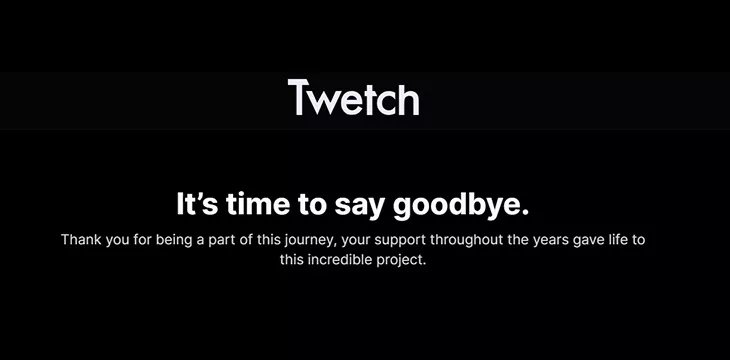|
Getting your Trinity Audio player ready...
|
Twetch, one of the most prominent and longest-running apps built on the BSV blockchain, has shut down. The social media network has been around since 2018, adding many innovative features, including payouts for interactions, native non-fungible tokens (NFTs) and trading platforms, chat encryption, and disincentives for trolls.
Twetch and its team discussed the shutdown not on Twetch itself but on the platform it was always intended to dislodge—X (formerly Twitter). Though Twetch had onboarded over 100,000 users in its six-year lifespan, it wasn’t enough to survive in an industry dominated by a single, monolithic competitor.
X isn’t exactly beloved by its user base and has outraged all positions on the ideological spectrum at some point or another with its moderation policies, but it continues to dominate the short-post market, thanks to the massive audience it provides.
GM
Today is the day. We are officially winding down Twetch.💔 It’s been a fun few years, and we can’t say thank you enough to all our customers who believed in us.
Your BSV & assets are on-chain. You can import your seed into Yours Wallet (@yoursxbt).https://t.co/4ykVIc2DFc
— Twetch (@twetchapp) June 5, 2024
Since its launch in 2006, many attempts have been made to dislodge X from its top spot, with more recent attempts focusing on freer speech and less moderation. These include Gab, Parler, Mastodon, and Truth Social, though these attempts have tended to become topic havens for interest groups that feel marginalized or censored in mainstream spaces.
Shutting down @twetchapp heavy af ngl 🫡
— Elon Moist (@coinyeezy) June 5, 2024
As a BSV-based social network, Twetch suffered a similar fate. Its main goal was free speech, and it wasn’t explicitly a forum for discussing Bitcoin or token collectibles, but a large majority of posts circled around those topics due to its users’ interests. Unable to break out of this niche despite efforts to broaden its appeal, it had limited avenues for growth.
I would do it all again.
It is with a heavy heart that we wind down Twetch.
Twetch was the most ambitious product I have ever been apart of. The fact that we executed as much as we did with so little resources should honestly be studied.
We built a fully functional twitter… https://t.co/NsfLIHivjE
— Randy (@nondualrandy) June 5, 2024
“I would do it all again,” wrote Twetch co-founder Billy Rose (aka @nondualrandy) in a long X post detailing the decision. “We built a fully functional Twitter competitor with a ton of innovative features and concepts – some of which were picked up by Twitter itself.”
He added that he still holds out hope that Twetch can return in some form, but “it really feels like things need to harden up in the crypto industry for a product like this to succeed long term.”
Co-founder Josh Petty (aka @coinyeezy) said: “We will be focused on building on-chain applications, taking all we learned and reapplying.”
Twetch’s innovations
Twetch always looked a lot like X on the surface, but its most compelling features were micropayments and blockchain records of all posts. Users made small payments to follow, like, or re-post others and received them for interactions with their material. This presented social media with an economic model far superior (in theory) to the advertising and data-harvesting income model for other platforms. These features were made possible by Bitcoin and later BSV technology, though only where a blockchain network remained fast, scalable, and affordable to transact on.
Other interesting add-ons were a “troll tax” where users could either block users who irritate them or charge them a prohibitive fee to reply to posts and a section where users could vote for new features by making donations to the developers.
It later added NFTs and a marketplace/trading platform, which, though popular with users, probably further defined Twetch as a home for digital asset users. Rose noted that Twetch’s proprietary NFT technology may have caused its downfall due to being a “closed system that only we used” rather than an open protocol where assets could be taken off-platform.
He added that “bloated databases and APIs that weren’t scaleable” were another factor, and the company was “unable to grow to a point where micropayment fees could sustain the business.”
A transformation at X itself over the past few years also contributed to Twetch’s downfall.
“Elon (Musk) buying Twitter and dedicating it to free speech was a major blow for Twetch adoption, which was built around the capture of the massive exodus and banning of Twitter users.”
Musk launched a takeover via shareholder buyout for Twitter in 2022, changing its name to “X” and with the stated goals of restoring free speech on the network and finding new ways to monetize content. Whether these goals have been met to users’ satisfaction remains a fiery debate, but it was enough to keep millions of people on board.
Reactions to Twetch’s closure covered the spectrum from grateful to frustrated. The Twetch.com page now displays unique seed/key information for the account currently logged in and guides asset holders to import that information into a Yours Wallet. However, and similar to the less-publicized RelayX wallet shutdown, proprietary NFTs will require conversion to the 1Sat Ordinals format to be useful again.
Twetch’s leadership team always displayed a high degree of social media savvy and comfort with the genre’s pace, trends, and ambiguous tone. Co-founder Josh Petty even showed his prescience by naming his X/Twitter account “Elon Moist” long before before entrepreneur Elon Musk bought and transformed Twitter. In the end, though, neither prescience nor superior features are guarantees of success as a competitor to the market leader, and it’s rare for a hegemon to be defeated with a front-on assault.
“Twetch wasn’t perfect, but it was certainly beautiful,” Rose concluded.
Watch Josh Petty and David Gerard: NFTS – New opportunity or crypto scam

 02-07-2026
02-07-2026 




